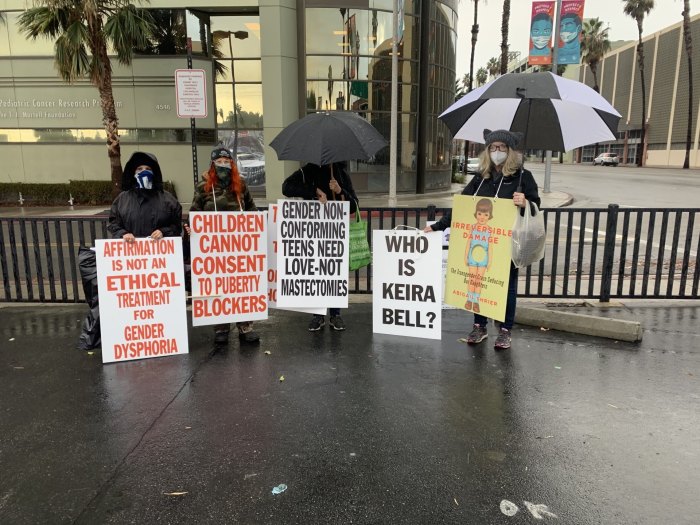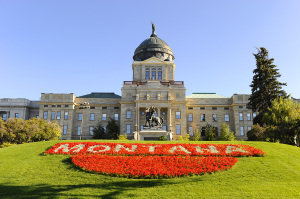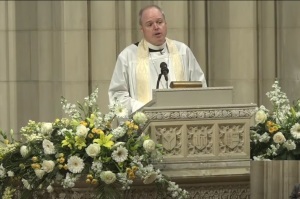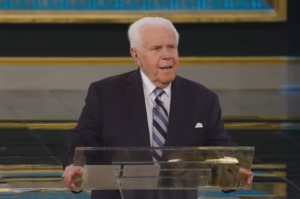Parents protest medicalized gender-transitioning of kids at Children's Hospital: 'I was totally in the dark'

Devastated Los Angeles-area parents of trans-identifying teenagers are raising awareness about the experimental medicalized gender-transitioning of minors by protesting outside a children's hospital where it is happening.
The parents, who have been contributing to a recent effort putting up billboards advertising journalist Abigail Shrier's book, Irreversible Damage, which scrutinizes why so many teenage girls have come to believe that they are transgender — one of which was taken down after having only been up for a day and a half amid community pressure — protested outside of Children's Hospital Los Angeles Monday, holding signs objecting to transgender medical interventions in youth. CHLA is home to one of the largest youth gender clinics in the country.
Among the messages on the signs were: "No child is born in the wrong body," "Stop transing gay kids," "Children cannot consent to puberty blockers," and "Gender non-conforming teens need love — not mastectomies."
Another sign read "Who is Keira Bell?" given the sparse U.S. media coverage of a young British woman who once identified as transgender and recently won in court in the U.K. in a judicial review against the Tavistock gender clinic in London, the medical facility where Bell underwent chemical puberty blockade and cross-sex hormones during her teen years. Bell, now 23, argued her body was irreparably harmed by the medical practices and is possibly sterilized, and that she was incapable of giving informed consent as a minor to the risky, experimental practices.
Two mothers who attended the protest, both of whom spoke on condition of anonymity with The Christian Post on Wednesday and have teenaged sons who have come to believe they are female, said they were blindsided by this in recent years, having known next to nothing about transgenderism previously. Their sons came to this conclusion about their identities in part because of school lessons about gender identity in sex ed classes and in anti-bullying campaigns. CP verified their identities.
Denise (not her real name) told CP that her 18-year-old son came out as gay when he was 14, which was not a surprise to his parents as he was always a "gentler, softer kid who got along better with the girls."
But in the next few months that changed as he started hinting that he was changing his gender and Denise could tell something more drastic was occurring. He summarily told her that he thought he was a girl and that he needed to take estrogen. Bewildered and confused, Denise called CHLA for some information and ended up speaking with a social worker in the office of Johanna Olson-Kennedy, a doctor who is among the most prominent advocates of medicalized gender-transitioning of children in the United States.
After five minutes, the social worker reportedly told her that she had better get her son on puberty blockers soon because "'once the Adam's apple comes out and the voice drops there's no going back.' Those were her exact words," Denise recounted.
Unsure if this was real or not, she waited a few weeks and then called the same social worker and again expressed her hesitation. Denise said the social worker suggested that she speak with a gender therapist and proceeded to recommend a few names, one of which was Olson-Kennedy's transgender spouse.
Seeing that as an unethical conflict of interest, Denise's suspicions were further raised and she scoured the internet to research the issue more.
"The more I find out, the more frightening it gets," she said of her ongoing, nearly four-yearlong discovery of the medical harms associated with taking puberty-blocking drugs and cross-sex hormones.
"But I knew right away after that phone call that these gender centers were not doing the right thing for our kids. And I just kept finding more articles and horror stories" on websites like 4thwavenow and others, she said.
Her son has not yet taken estrogen or pursued surgery but dresses as a female with his friends and continues to say he wants to go on hormones. Now 18, he can do so without parental consent.
Denise has been a part of a support group for parents in similar situations for approximately three years.
"We talk, we complain, and we cry. But you know, we've got to do something here. It's a very lonely place. No doctors will listen to you. No teachers, no therapists, no school principals. We're alone," she said.
Asked if she has managed to find a single dissenting physician who is opposed to gender-transitioning minors, Denise said she is paranoid about telling any medical professional about her objections because they then immediately think parents are bigoted for disagreeing with their child. When she dared to raise her concerns with their family pediatrician, he did nothing and basically ignored them, she said.
"No one knows how to handle it. And even my own personal therapist, she's been with me through this whole journey, she still doesn't completely get it. She still feels like we need to accept this," Denise explained.
Clara (not her real name) got involved in protesting because her 16-year-old son, who, though he has some mental processing issues, never showed any signs of gender confusion until he learned about gender identity during sex ed lessons and anti-bullying campaigns at school, has self-identified as the opposite sex.
In a casual conversation about a year and three months ago, he mentioned he was transgender, which was a total shock. He came out as trans along with another male friend he knew from Boy Scouts.
"He was always the happiest kid you'd ever met. I thought he had good self-esteem and everything sort of changed that day. He became depressed and immediately wanted hormones and wanted to go to a gender doctor and an endocrinologist … I didn't know who this kid was as he changed overnight," she said of her son.
Clara and her husband told him they did not support the use of hormones because of how dangerous they are. But he asserted that on his 18th birthday he intends to go to Planned Parenthood to acquire them anyway. Clara believes that when her son got cut from an athletic team he had always wanted to make, it contributed to him feeling like there was something wrong with him and that a new gender identity was the answer.
"I was totally in the dark, I knew nothing," she said, when asked if she had ever heard of minors being medically gender-transitioned during their pubertal years. She had met a few trans-identifying adults in their 30s and 40s and who had psychologically suffered from intense gender confusion for their whole lives but their process and course of treatment was totally different than what is besetting young people today.
"If I can't save my own child, I'd like to save any child," she said, speaking to why she decided to protest with other parents on Monday outside CHLA.
When she visited a gender clinic in Los Angeles, the clinicians told them, with their son present, that their son would never change his mind and proceeded to attempt to rush them into exploring a gender-transition. On the first initial meeting, the clinician urged them to start calling their son "she" or "her" but Clara felt in her gut that such advice was not sound.
Like Denise, she started researching the issue extensively, read Shrier's book, and gradually started connecting with other people who were pushing back against gender ideology in their spheres of influence. Yet when she has tried to talk to people she considered friends about her concerns, they would regard her as a terrible parent for not wanting to transition her child.
Politically speaking, Clara always saw herself as "left-of-center" but then moved more toward the center. Today, she feels "politically homeless" and has connected with a wide range of people from a variety of backgrounds. Her father-in-law lives in a very conservative small town in a conservative southern state and while visiting recently she met a mother who lives in the neighboring rural town. This mother's daughter is in school where five girls reportedly believe they are transgender.
"It's everywhere. There are parents who say there are four kids on their block in small-town USA are identified as this," she said.
Because she had no idea prior to her own family experience with this, she knows that very few people are aware of what is occurring in medical institutions and therapist offices across the country.
While protesting Monday, they received a few horn honks from drivers who expressed solidarity and agreement with them. They also got a few unkind words from passersby.
"I just can't sit around and watch it happen. I have to do something," Clara said.
She is encouraged by developments in the U.K. with recent changes in the school curriculum, the Keira Bell verdict against the Tavistock clinic, and trans lobby groups like Mermaids falling out of favor with famous people and organizations. Yet with the many dozens of gender clinics now operating across the vast U.S. landscape versus the lone gender clinic in the comparatively small U.K., it will be a much tougher effort, she believes.
"We have to have lawsuits here and without them, I don't think it will open people's eyes. Because people think being trans is the same as being gay and it's so not. Being gay, you don't have to take hormones or change your body," she said.
Denise said of the blossoming protests and billboard efforts: "We're all getting a little desperate and feeling like we have to do something."
"We want to get the word out and we realize that no mainstream media wants to touch it because everything is so darn PC. It's a very strange place to be. But it's our only option as parents," she lamented.
"I was a Democrat-liberal until two years ago. Now I am conservative. And my eyes were not open and I feel like they're almost too open. I've seen too much and it's scary."
She emphasized: "No matter your political affiliation, you've got to do your research."
"This is not a political issue; this is about protecting our kids. And when there are so many detransitioners out there that have changed their minds, why would a doctor ever consider giving puberty blockers to a young, gender-confused child when there is a huge possibility that they may be gay, or they have other issues, or they're going to grow out of it?"





























